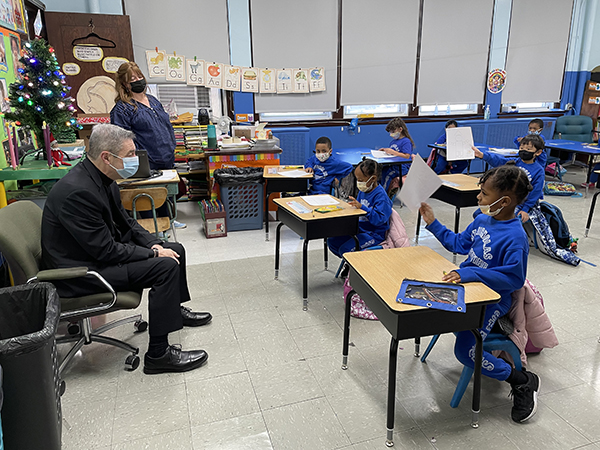
JAMAICA — A school visit by Bishop Robert Brennan served to reinforce his view that parents of students in the Diocese of Brooklyn deserve vouchers, tax credits, or some other type of state-funded support. That would give families a real choice in educating their children, he said.
“I will advocate for it whenever and wherever I can,” Bishop Brennan said while visiting St. Nicholas of Tolentine Catholic Academy, Jamaica, on Dec. 14. He said interacting with the students reaffirmed to him why school choice policies are necessary.
“It’s vitally important,” he said as he toured the academy, visiting every classroom and telling the students, “I’m the new guy in town.”
Robert Lowenberg, the academy’s principal, estimated that 30% of the 300 students in his school rely on scholarships for tuition and other costs.
“It would be a big help to our families who struggle with the costs of a Catholic education,” Lowenberg said.
The need for a new policy to support students’ education — often called school choice — is something Bishop Brennan has talked about on various occasions since he was installed in his new ministry on Nov. 30. He included the topic in his remarks at the Bishop’s Luncheon on Dec. 7 — which raised $300,000 for Catholic education.
New York State has no policy providing state education funds for those families who choose private and religious schools.
By contrast, the Diocese of Columbus, where Bishop Brennan ministered for two years before arriving in Brooklyn and Queens, has school voucher programs set forth in Ohio law.
Ohio is one of 14 states that offer financial support directly for children not attending public schools.
Under a school voucher system, parents are eligible for funds from the state-designated for use toward the education of their children, especially to help pay tuition, or otherwise cover public school costs in the standard way.
Ohio has five separate voucher programs for parents to choose from. The first voucher program was instituted as a pilot project in Cleveland in the mid-1990s. Some 3,000 parents received vouchers of up to $2,250. However, the program was challenged in court by the American Civil Liberties Union (ACLU), which charged that it violated the separation of church and state as outlined in the U.S. Constitution.
The case went all the way to the U.S. Supreme Court, which, in 2002, ruled in favor of the voucher program.
For the 2021-2022 school year, 69,000 Ohio students are benefiting from vouchers. The total cost to Ohio taxpayers is expected to be $628 million.
Bishop Brennan acknowledged it was a bit of a culture shock to come to New York and realize there is no similar program here.
In Ohio, “parents have a little bit of a choice over the education of their children,” he said at the luncheon on Nov. 7. “They are able to use a little bit of the money they pay in taxes to go to private schools.”
New York has flirted with the idea of school vouchers in the past but has always rejected it. In most cases, legislation favored by Republicans has been blocked by Democrats.
Opposition has come from many sources, including the teachers’ unions, like the United Federation of Teachers, who argue that vouchers or tax credits would siphon government funding from public schools.
In lieu of vouchers, lawmakers supporting school choice changed tactics and produced alternative legislation, including education tax credits parents could use toward the costs of their children’s education, such as tuition, books, and supplies.
In 2006, Martin Golden, at the time a Republican state senator representing Bay Ridge, introduced a bill to create an education tax credit of up to $500 for parents, at a total cost to the state of $400 million. The bill was passed by the State Senate but rejected in the Assembly.
Golden tried again in 2012 and 2016, with the same result. In 2016, after the Senate passed his bill, Golden issued a statement calling on the Assembly to follow suit.
“In New York State, every student, no matter where they attend classes, deserves a quality education and the resources they need to succeed,” he said.

More partisan reporting from The Tablet, a clearly pro-Republican publication that doesn’t represent all Catholics. Voucher programs divert funds from traditional public schools generating unequal outcomes for students. The point of public schools is for all students to use them and for tax dollars to make them better. If Catholic parents don’t want to use them, they should not be freed of their obligation to support public schools across the board. What is the value of bringing up what Martin Golden did in 2006? Martin Golden also used public funds as his own personal money by diverting money to his family business. Martin Golden is super disrespectful to woman. What does Martin Golden have to do with The Tablet?